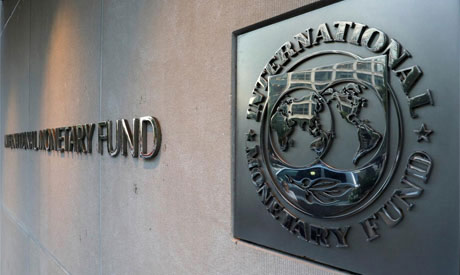
File Photo: International Monetary Fund (IMF) logo (Photo: Reuters)
The International Monetary Fund (IMF) has downgraded its predictions for global economic growth in 2019 to 3 percent, the slowest pace since the global financial crisis in 2008.
In a report on the world economy that was released on Tuesday, the IMF said that the global economy is in a synchronised slowdown and continues to be weakened by rising trade barriers and increasing geopolitical tensions.
“We estimate that the US-China trade tensions will cumulatively reduce the level of global GDP by 0.8 percent by 2020. Growth is also being weighed down by country-specific factors in several emerging market economies, and by structural forces, such as low productivity growth and aging demographics in advanced economies,” reads the report.
Shrinking manufacturing activity
The report points out that “the weakness in growth is driven by a sharp deterioration in manufacturing activity and global trade, with higher tariffs and prolonged trade policy uncertainty damaging investment and demand for capital goods.”
In addition, according to the report, “the automobile industry is contracting owing also to a variety of factors, such as disruptions from new emission standards in the euro area and China that have had durable effects. Overall, trade volume growth in the first half of 2019 has fallen to 1 percent, the weakest level since 2012.”
On the other hand, “monetary policy has played a significant role in boosting growth, as in the absence of inflationary pressures and facing weakening activity, major central banks have appropriately eased to reduce downside risks to growth and to prevent de-anchoring of inflation expectations.”
“In our assessment, in the absence of such monetary stimulus, global growth would be lower by 0.5 percentage points in both 2019 and 2020,” the report found.
Emerging markets
In emerging markets and developing economies, growth has also been revised down to 3.9 percent for 2019 compared to 4.5 percent in 2018, owing in part to trade and domestic policy uncertainties, and to a structural slowdown in China.
The report found that the uptick in global growth for 2020 is driven by emerging market and developing economies that are projected to experience a growth rebound to 4.6 percent.
“About half of this rebound is driven by recoveries or shallower recessions in stressed emerging markets, such as Argentina, Iran, and Turkey, and the rest by recoveries in countries where growth slowed significantly in 2019 relative to 2018, such as Brazil, India, Mexico, Russia, and Saudi Arabia. There is, however, considerable uncertainty surrounding these recoveries, especially when major economies like the United States, Japan, and China are expected to slow further into 2020,” read the report.
Geopolitical tensions
The report also touched upon a number of escalating risks that are threatening global economic growth, including heightened trade and geopolitical tensions, such as Brexit-related risks, which could further disrupt economic activity, and derail an already fragile recovery in emerging market economies and the euro area.
“This could lead to an abrupt shift in risk sentiment, financial disruptions, and a reversal in capital flows to emerging market economies. In advanced economies, low inflation could become entrenched and constrain monetary policy space further into the future, limiting its effectiveness,” the report said.
To obtain sustainable growth, the IMF argues that countries “need to undertake structural reforms to boost productivity, improve resilience, and lower inequality.”
“Reforms in emerging market and developing economies are also more effective when good governance is already in place,” it noted.
Short link: